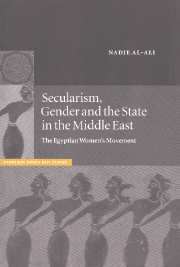Book contents
- Frontmatter
- Contents
- Acknowledgements
- Note on transliteration
- List of groups, networks and organizations
- List of abbreviations
- Introduction
- 1 Up against conceptual frameworks: post-orientalism, occidentalism and presentations of the self
- 2 Contextualizing the Egyptian women's movement
- 3 Self and generation: formative experiences of Egyptian women activists
- 4 Secularism: challenging neo-orientalism and ‘his-stories’
- 5 From words to deeds: priorities and projects of contemporary activists
- 6 A mirror of political culture in Egypt: divisions and debates among women activists
- Conclusion: ‘standing on shifting ground’
- Bibliography
- Index
- Other books in the series
6 - A mirror of political culture in Egypt: divisions and debates among women activists
Published online by Cambridge University Press: 22 September 2009
- Frontmatter
- Contents
- Acknowledgements
- Note on transliteration
- List of groups, networks and organizations
- List of abbreviations
- Introduction
- 1 Up against conceptual frameworks: post-orientalism, occidentalism and presentations of the self
- 2 Contextualizing the Egyptian women's movement
- 3 Self and generation: formative experiences of Egyptian women activists
- 4 Secularism: challenging neo-orientalism and ‘his-stories’
- 5 From words to deeds: priorities and projects of contemporary activists
- 6 A mirror of political culture in Egypt: divisions and debates among women activists
- Conclusion: ‘standing on shifting ground’
- Bibliography
- Index
- Other books in the series
Summary
In Egypt – as in many other post-colonial societies – contestations of identity and authenticity are part and parcel of complex processes of self-definition. Sometimes these contestations take an explicitly political form and are articulated as anti-imperialist positions. This is the case in the debate about foreign funding of local research and development activities, for example, which, in the view of some political actors, is a form of external meddling and interference. As mentioned earlier, the debates about foreign funding have to be set in the context of Egypt being the single largest recipient of aid from the United States after Israel. Moreover, foreign aid ranges from bilateral and multilateral projects to the funding of specific projects at ‘the grassroots’ by various international funding agencies. Perceptions about international organizations and the value given to international conferences must also be considered in the light of struggles for political independence and especially the rejection of increasing American influence.
However, at other times, debates about identity and authenticity are formulated less in political than in cultural terms. This tendency becomes noticeable in the controversy about the cultural frame of reference for Egyptian women's activism. In chapter 4 I addressed the role of religion as cultural marker with regard to authenticity and identity. At this point I shall concentrate mainly on the dispute about the universality versus specificity of women's rights and the ‘culturalization’ of many political debates.
- Type
- Chapter
- Information
- Secularism, Gender and the State in the Middle EastThe Egyptian Women's Movement, pp. 185 - 215Publisher: Cambridge University PressPrint publication year: 2000



